
American Rescue Plan Act (ARPA)
What is the American Rescue Plan Act (ARPA)
The American Rescue Plan Act of 2021 (ARPA) is the latest in a series of Coronavirus Disease 2019 (COVID-19)-related relief and economic stimulus legislation. ARPA State and Local Fiscal Recovery Funds help build economic capabilities for state, local, territorial, and tribal government agencies to meet pandemic response needs, address the negative economic impacts, and build a strong and equitable recovery from this public health crisis. With this federal aid, jurisdictions have been able to strengthen and support vital public services put at risk by or needed because of the pandemic.
How Do ARPA Funds Impact Boulder County?
On March 11, 2021, the American Rescue Plan Act (ARPA) was signed into law. As part of ARPA, the Coronavirus State and Local Fiscal Recovery Fund (SLFRF) was established to address certain impacts from the pandemic. Boulder County was allocated $63,359,749.
States, territories, counties, and cities with populations of 250,000 or more are required to publicly post and submit annual Recovery Plan Performance Report to the Treasury Department by July 31st of each year. The plan focuses on pandemic efforts to date and how Boulder County’s approach to using ARPA funds will support a strong and equitable recovery, respond to the public health emergency and negative economic impacts, and address racial, health, and economic disparities.
Community Engagement and Planning
The Boulder County Board of Commissioners (BOCC) partnered with the Community Foundation of Boulder County, consultant Rebuild by Design, and local community partners on community engagement to ensure ARPA funding investments achieve the highest level of positive and equitable impact for the community.
The first phase of the community engagement process entailed six weeks of collecting feedback from residents, businesses, workers, and students in the county. From more than 1500 completed surveys and 41 events, the engagement process revealed that the greatest challenges facing community members are:
1) Negative Economic Impacts
2) Housing Affordability
3) Cost of Living
4) Mental Health
5) Childcare
These results were consistent across gender, race, ethnicity, sexual orientation, employment status, and disability status.
The second phase consisted of a four-month Working Group process to delve more deeply into three priority areas and ultimately make recommendations for specific projects to address the needs in these areas: Economic Challenges, Housing Affordability, and Mental Health and Social Resilience. Read below for more.
The partner agencies supporting these efforts alongside Boulder County are:
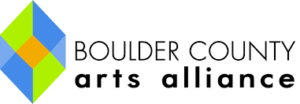
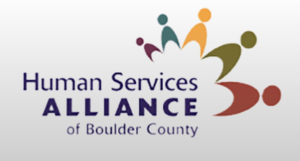
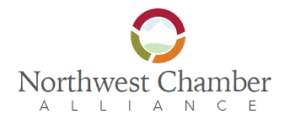
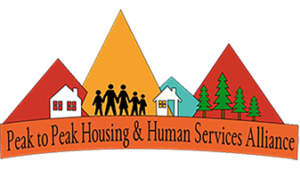
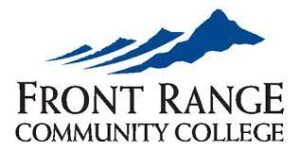
The process for collecting feedback in Phase 1 entailed six weeks of in-person and online outreach (September 1st – October 15th), in partnership with community members and leaders, seeking ideas for building a durable and equitable recovery. County staff and community partners organized and/or attended over 41 events throughout the county to listen to residents’, businesses’, workers’, and students’ concerns and gathered more than 1500 surveys in English, Spanish, and Nepali, “Boulder County Wants to Hear from You!”

When asked “What’s one thing Boulder County can do to improve the lives of you, your loved ones, or your business?” an overwhelming number of respondents suggested increased and improved affordable housing options. The other top suggestions include economic support to offset the impacts of the pandemic, improved mental health services including initiatives to combat social isolation from the digital divide, increasing affordable childcare options, and greater support for the arts and artists.
Feedback also revealed skepticism and doubts from the community that their opinions will be heard. We also heard that while the County has made resources available to those who have struggled throughout the pandemic, many individuals and businesses are unaware of the programs they can access or do not know how to navigate the current systems.
For more insights from the engagement process, lessons learned, and recommendations for Phase 2, read the ARPA Steering Committee Preliminary Engagement Report (in English), or the ARPA Steering Committee Preliminary Engagement Report (in Spanish), or watch the ARPA Steering Committee’s November 10th presentation to BOCC
The BOCC also hosted an ARPA-focused Town Hall that took place on Thursday, Sept. 9, 2021. Watch the Town Hall video and learn more about the community engagement process and Q&A from Boulder County residents! In addition to the survey and other opportunities for community engagement, existing data and prior feedback from the community were collected and synthesized
The BOCC and ARPA Steering Committee appointed three ARPA Working Groups in December 2021, comprised of community members that understand the diverse interests of Boulder County and can speak first-hand to the needs of those most impacted by COVID-19, moving into the next phase of community engagement and planning. Members were appointed in the three working group focus areas of: Economic Challenges, Housing Affordability, and Mental Health and Social Resilience. Working Groups met from February to May 2022, drawing from educational and informative workshops, subject matter experts, the needs and ideas of community members, Treasury guidelines for ARPA and the ARPA framework to promote equitable outcomes, and more. The recordings of these meetings are posted on the ARPA website.
Each of the working groups included a community partner and County department head as co-leads, with a County Commissioner as sponsor to support the process. Working groups added additional members in subcommittees or as advisors to draw from lived and subject matter expertise and experience in the community. Click on the tab: ARPA Working Groups Descriptions below for detailed information on the structure, roles, and responsibilities of each one the working groups and its members.
Working Groups proposed recommendations to the BOCC in May 2022 that support ARPA investments in each of the three focus areas for a total of approximately $46 million in funding. Phase 2 projects were approved at business meetings in June and August 2022
Each of the categories for the working groups is directly based on the findings from the initial outreach to Boulder County communities. This community engagement process identified Economic Challenges, Housing Affordability, Mental Health, and Social Resilience among the greatest concerns for residents, business owners, workers, and students in Boulder County.
You can find detailed results of the community engagement process following the link to the ARPA Steering Committee Preliminary Engagement Report.
The following is the description of the focus areas and the priority issues for each of the three working groups:
Economic Challenges – Economic challenges are the number one issue affecting Boulder County residents, businesses, and students. Many survey respondents raised the interconnected issues of cost of living, small business needs, workforce development, childcare, and other economic issues. This working group will recommend initiatives that address economic challenges within the community, with a particular emphasis on the issues magnified by the pandemic.
Co-Chairs: Rebecca Novinger, Human Services Alliance and
Susan Caskey, Boulder County, Co-Director of Housing and Human Services
Sponsor: Marta Loachamin, County Commissioner
Housing Affordability – The challenge of housing affordability for the residents of Boulder County existed before the pandemic. For some community members and businesses, the loss of income due to the pandemic exacerbated housing instability. This group proposed solutions to address the housing crisis in Boulder County for both renters and owners alike.
Co-Chairs: Karen Gerrity, InterMountain Alliance, and BOCO Long Term Recovery Group
Paul Jannatpour, Boulder County, Co-Director of Housing and Human Services
Sponsor: Claire Levy, County Commissioner
Mental Health and Social Resilience – Being physically apart from friends and family during lockdown brought on many challenges, including social isolation, worsened mental health, workforce burnout, and compassion fatigue. While some suffered due to too much time in a digital world, others struggled due to lack of access or ability to use technology. This group researched policies and programs that will bring communities together and address social isolation, and mental health and public health challenges.
Co-Chairs: Katrina Harms, Peak to Peak Housing and Human Services and
Robin Bohannan, Boulder County Director of Community Services
Sponsor: Matt Jones, County Commissioner
To better understand the impacts of the pandemic in the community and the needs of community members, Boulder County engaged in research and a community engagement process. Boulder County retained TDA Consulting, Inc. to conduct a gap analysis analyzing data on the pandemic’s impacts in Boulder County, using ARPA spending categories to categorize data and summarize priority needs identified by community stakeholders. Boulder County commits to promoting and practicing racial equity, and the report incorporates data, when available, that illuminates ways the pandemic has had racially disproportionate impacts. TDA Consulting’s report, Impacts of the Pandemic on Boulder County provides more information.
With the assistance of consultant Rebuild by Design and in collaboration with Community Foundation Boulder County and the ARPA Steering Committee, the first phase of the community engagement process sought community feedback regarding needs in the community and recommendations for a transformative and equitable recovery. In November 2021, the ARPA Community Steering Committee shared the results with the ARPA Steering Committee Preliminary Engagement Report in English and Preliminary Engagement Report in Spanish.
The following reports further explain the process, findings, and recommendations for each phase of the community engagement and planning process:
- Boulder County ARPA Final Report: A Community-Driven Path Towards an Equitable Recovery
- ARPA Working Groups Final Proposal Programs
- Final Proposal Programs (Spanish)
Funding Allocations
$63,359,749 million total ARPA SLFRF funding awarded by the U.S. Department of the Treasury to Boulder County.
Spring 2021
Pandemic Response and Immediate Needs
2021 -2022
Community Engagement and Planning
2022 – 2026
Phase 2 Project Implementation
The U.S. Department of the Treasury launched this much-needed financial relief to address the following:
- Support urgent COVID-19 public health response efforts to continue to decrease spread of the virus;
- Support immediate economic stabilization for households and businesses;
- Address systemic public health and economic challenges that have contributed to the inequal impact of the pandemic;
- Replace lost revenue for governments to strengthen vital public services and help retain jobs; and
- Make infrastructure investments in broadband, clean water, and wastewater facilities.
Treasury requires that local governments address disparate impacts and achieve equitable outcomes with ARPA funds and cites President Biden’s Executive Order on Advancing Racial Equity and Support for Underserved Communities Through the Federal Government, signed on January 20, 2021. The BOCC stated its support for that executive order and for advancing racial equity in a Jan. 27, 2021, statement.
Boulder County’s annual recovery plan describes response and recovery efforts to date, community engagement and planning efforts, consideration of equity impacts and outcomes, actual and planned uses of funds, and other information required by Treasury. See the most recent ARPA SLFRF Recovery Plan Performance Report.
Boulder County has made two rounds of funding allocations from the $63,359,749 American Rescue Plan Act (ARPA) award that the County received from Treasury. The Board of County Commissioners approved an initial allocation of $5,531,880 in 2021 toward immediate needs in pandemic response and recovery. The immediate needs process in Summer and Fall 2021 evaluated and responded to unmet needs of the community and internal county operations as a result of the COVID-19 public health emergency that were not funded in Boulder County’s annual budget cycle.
To determine how to expend the remainder of funds, aside from administrative and a reserve for pandemic costs, the County and partners engaged in a community engagement and planning process, with the assistance of consultant Rebuild by Design and in collaboration with Community Foundation Boulder County and the ARPA Steering Committee. First, the County heard from more than 1500 residents about needs and impacts of the pandemic.
Community feedback identified three areas of greatest need: Economic Challenges, Housing Affordability, and Mental Health and Social Resilience. Working Groups formed around each of these issue areas to identify projects for a transformative and equitable recovery. Working groups were composed of community members from non-profits, businesses, and other stakeholders, and each was sponsored by a County Commissioner and co-led by a community leader and a Boulder County department head. Their work was informed by feedback from community feedback as well as stakeholder input, best practices and research, advice from subject matter experts, and other ways. Working Group members developed project ideas and then prioritized according to what would have the most impact and other criteria. Proposals were presented to the Board at a public hearing on May 3, 2022 and approved at Business Meetings in June and August 2022.
The county also previously received CARES Act funding in 2020 and Treasury Emergency Rental Assistance funds through early 2023, in addition to ARPA State and Local Fiscal Recovery Fund dollars. Some of the programs and services CARES Act funds supported included grants for childcare centers, human services initiatives, local non-profits support, telework resources for county staff, public health support, and economic assistance to local businesses and non-profits.
PHASE 1: ARPA SLFRF Immediate Needs Project
Administrative Support for ARPA, $3,602,665
Funding for staff to assist for administration and management of ARPA and various grant funding received between 2021 and 2024. Duties include facilitating requests for funding, eligibility evaluation, financial compliance, accounting, reporting, account reconciling, audit preparation, and other related duties. Staff resources also were needed for communications, community engagement, data and evaluation, briefings, presentations, training, and other reporting and procedure development.
ARPA Planning Contractor, $60,119.21 (Project Complete)
Consultant for the Boulder County Commissioners’ Office synthesized input from diverse internal and external stakeholders on pandemic response and recovery needs. The consultant delivered a report to the BOCC that analyzed data on how the pandemic impacted Boulder County and gathered input from the community, staff, and other partners. This data includes input specifically related to use of SLFRF funds as well as other existing data and reports that reflect the priorities and needs of different parts of the Boulder County community. In addition to summarizing common themes and priorities, a gap analysis identified information gaps where specific communities are not represented.
ARPA Community Engagement, $301,618 (Closed)
This project was closed and remaining funds added into the Administrative Support project. The Boulder County Commissioners’ Office designed a community engagement process to plan the longer-term investment of ARPA funding, and community engagement work continues for accountability, transparency, reporting, and other needs. This effort included costs for events, partner engagement, printed materials, translation, and related expenses to support community engagement and community feedback through a survey and at community events. This project also provided funding for community engagement staff responsible for community engagement strategy and implementation, representing the county as liaison and communication link, planning and coordinating meetings with the public and participating in community meetings, supporting data and reporting efforts, and supporting communications work.
Boulder County Public Health ARPA Administration, $247,538 (Project Complete)
Funding for temporary staff to assist in administration and management of Public Health ARPA projects. Duties included financial compliance, accounting, reporting, account reconciling, and audit preparation. This position resided in Public Health and facilitated information flow between Public Health and the Boulder County ARPA Team.
Housing and Human Services Administrative Support, $202,482 (Closed)
This project was closed and remaining funds added into the Administrative Support project.
Community Services Support, $421,265 (Closed)
This project was closed and remaining funds added into the Administrative Support project.
Boulder County Public Health COVID Testing $200,992 – Access to COVID-19 testing, especially for vulnerable and hard-to-reach populations, was a critical immediate need given the spikes in cases due to variants. BCPH worked with Boulder Community Hospital to ensure access to testing in congregate settings, shelters, outbreak sites, and more remote mountain communities such as Nederland. These populations represent priority populations (e.g., older adults in Long-Term Care Facilities, homeless, homebound, etc.) and vulnerable groups, including those in congregate settings (e.g., assisted living, etc.) who were exposed to a positive case, as well as geographically remote residents. The funding was to support reimbursement of services since March 3, 2021, for Boulder Community Hospital, and to provide pass-through funds to continue the work.
Juvenile Assessment Center COVID positions, $130,084 – Throughout the pandemic the Juvenile Assessment Center operated continuously in-person as a secure juvenile detention facility for Boulder County law enforcement. The Juvenile Center is the only county-funded intake, assessment, and short-term detention facility in the state, with a maximum holding capacity of 20 youths, ages 10 to 17. This facility provides structured programming including educational and life skill activities in order to reduce further harm. Well trained and sustained full-time positions was a critical need to maintain safe and secure care for our county’s most vulnerable families and juveniles. The scope of work for this request extended two full-time term positions through the COVID-19 recovery.
Boulder County Public Health Vaccine Community Support $1,622,574
Funding supported several community communications efforts: 1) Funds to continue the VECC (Vaccine Equity Coordinating Committee) to reach much of the remaining 95,000 people in Boulder County who still needed to be vaccinated and continued containment and mitigation outreach. Funding was for the VECC Coordinator and Project Manager to coordinate and support the planning and implementation of vaccination programs. 2) Support for COVID-19 communications, including a Bilingual Communications Specialist and funds for bilingual COVID-19 vaccination campaigns. Community Ambassadors worked to ensure priority populations were protected and increasingly vaccinated, and funding continued that collaboration. 3) Variants created an urgent need to fully staff the BCPH Call Center to provide accurate information to the public including information on testing, vaccinations, and new Public Health Orders. Funds covered three staff positions. 4) Finally, support was needed to reconvene a Business and Community Liaison team to respond to the business/community needs. Funding was for a Coordinator and two staff (at least one bilingual/bicultural), along with up to $100,000 pass-through funds for a) legal support from the County Attorney’s office and b) to retain and pay for an outside council for investigating, filing, and litigating violations of individuals and businesses of public health orders and for representing Boulder County Public Health in legal proceedings concerning public health orders.
Low-Wage Workers Fund, $250,000 (Project Cancelled – Funds reallocated) – Many low-wage workers in Boulder County couldn’t afford to quarantine or isolate due to COVID-19. Although there are some paid leave protections in Colorado, they don’t apply to all workers, and many employees don’t feel they can advocate for their employee rights for a myriad of reasons, including documentation status and/or fear of retaliation. Exposure to COVID-19 resulted in isolation or quarantine. These periods of time where one is prohibited from working caused financial strain, especially for low-wage workers. This program was to provide direct cash assistance to individuals who need to isolate or quarantine as a way to ensure their financial stability, such as affording general household expenses, and to reduce the further transmission of COVID-19 throughout the community. Qualification requirements included: Boulder County resident; individual tested positive OR applicant was a caregiver to a family member that tested positive for COVID-19; an individual income of $600 or less per week; household Income: Eligible for Health First Colorado; and worked within last two weeks before testing COVID-19 positive or having to caregive. Cash supports were intended to be between $1000-$1500. Assistance was intended to be limited to one grant per household.
Boulder County Public Health Food Insecurity, $130,178 (Project Complete)
The pandemic resulted in greater food insecurity within Boulder County, and programs that served “gap” populations who were not eligible for federal programs or that supplement insufficient programs saw larger waitlists. To best facilitate an urgent response, BCPH increased pass-through funding to BCPH’s Women Infants and Children (WIC) Gap Funding program to provide food benefits to additional families. This program enhanced WIC fruit and vegetable benefits, offering weekly home delivery and a farmer’s market model. In a typical year, WIC families may only receive $8 per person per month for fresh produce. This funding enhanced food security for families while supporting local farmers and agriculture and partners at the Boulder and Longmont Farmers Markets, as well as economic revitalization through multiplier effects and supporting healthy food consumption. Boulder County Farmers Markets (BCFM) distributed $20 in healthy food incentives to Boulder County WIC families one time weekly via home delivery or at in-person farmers markets.
Left Behind Workers Fund, $299,999 (Project Complete)
The Left Behind Workers Fund (LBWF) provided financial support to workers that were adversely impacted by the COVID-19 pandemic and were ineligible for unemployment insurance and other stimulus funds. The LBWF provided $1000 in direct cash assistance to workers who experienced the loss of employment after February 2020, including complete job loss, job loss of 20+ hours/week, or previous loss of 20+ hours/week for a month or more, as well as those impacted by an unpaid leave of absence from work due to school or daycare closures, the need to care for family members, or the need to remain quarantined after possible COVID-19 exposure.
Eviction Representation, $184,325 (Project Complete)
The City of Boulder’s “No Eviction Without Representation Program” provides legal aid and representation to those who are facing eviction and cannot afford legal support. The City of Boulder program was funded by a landlord fee required through a ballot measure passed by voters in November 2020. Similar services were not available throughout the rest of Boulder County except through grant-funded services when available. Due to COVID-19 and the end of the eviction moratorium, the number of people county wide needing legal aid who were facing eviction increased, and funds were needed to provide these services county wide.
Digital Divide Project Manager, $14,022 (Project Complete)
Start-up funding was provided for temporary staff to assist in program management of ARPA Digital Divide project(s). The Digital Divide program provided devices and connectivity to youth, individuals, and families during the pandemic so they could access school, employment, services, and other resources.
Employment Services, Workforce Boulder County, $385,000 (Project Complete)
This project involved hiring five individuals to support local residents’ employment and re-employment needs. Workforce Boulder County hired four “Employment Advisors” supported by one supervisor. The advisors met one on one with the public and provided triaging services, information and referrals, coaching, and connection to jobs, working out of Longmont and Boulder offices. This service complemented other services including the Virtual Call Center, Career Development Workshops, and the more intensive case management services (including training and retraining).
Workforce Boulder County Virtual Call Center, $370,000 (Project Complete)
The Virtual Call Center (VCC) was regarded as a “hub” for anyone impacted by unemployment. VCC assisted people who lost jobs due to the pandemic and related economic downturn, helping people in our community regain economic and employment stability for themselves and their families. People experienced significant wait times attempting to reach the State Unemployment Office, and Workforce Boulder County Virtual Call Center provided a place for people to reach a resolution. The scope of work was answering calls, identifying the unique needs of each person, and determining the next best steps toward sustainable employment. VCC agents specialized in understanding the unemployment system, having a working knowledge of the career development process, staying abreast of the internal and external sources available to provide warm referrals, and striving to offer the best in public service.
District Attorney’s Office Court Reporter Funding, $53,649 (Project Complete)
The District Attorney’s Office managed a backlog of criminal cases and jury trials that were not able to be resolved during the pandemic as in-person litigated hearings and jury trials were not being held. The backlog of jury trials and court cases was extensive and causing the trial docket to be over capacity and set many cases deep during any given trial week. The most serious offenders and the most serious criminal cases, such as sexual assault, crimes against children, and homicide, remained unresolved and needed to continue to proceed through litigated hearings and jury trials. Due to state budget cuts from the pandemic, the 20th Judicial District State Courts laid off their Court Reporters. Without a proper court reporter record for appeal, the information is assumed to be non-existent in the record, and that can lead to the case being overturned and sent back the trial court for retrial by the District Attorney’s Office. To fill this need gap, funding was provided for court reporters.
Boulder County Public Health Support for Childhood Health and Development, $159,265 (Project Complete)
Pandemic-related closing of childcare centers and increased earnings pressure on families caused an increase in unlicensed childcare facilities. BCPH provided support to dozens of unlicensed providers through a bilingual/bicultural position based in the BCPH Child Health Promotion Program. This position served previously unserved Family, Friend, and Neighbors Network providers to enhance child health outcomes and quality, adherence to public health guidelines, and reliable care for families returning to the workforce, and funding for childcare provider essential needs and equipment. Additionally, children experienced significantly increased stressors that impacted their socio-emotional development. ARPA funding provided extended subscriptions to two key programs for one year, including: 1) Developmental screening services to identify children who need early intervention services; 2) Extension of the LENA (Language Environment Analysis) program subscription to train parents in child development and parent education programs to help parents navigate trauma children have experienced.
Support for a Successful Implementation of the Emergency Choice Vouchers, $68,215 (Project Complete)
A full-time case manager specializing in Move On protocols provided support to individuals experiencing homelessness. HUD released Emergency Choice Vouchers to eligible Housing Authorities to connect individuals experiencing homelessness to housing; this position helped individuals with vouchers to secure vacant apartments. By providing up to two months of market-rate rent to landlords who report a vacant unit, this program ensured individuals with vouchers could rapidly connect to a unit willing to receive them. This approach also assisted individuals who had challenging backgrounds, as these funds and approaches could be used as tools to recruit new landlords.
Program Evaluation and Data, $389,029 (Closed)
This project was closed, and remaining funds added into the Administrative Support project.
Assistance for the Family Resource Centers: OUR Center, Sister Carmen Community Center, and Emergency Family Assistance Association $1,500,000
Funding for the Family Resource Centers (FRCs), and the populations they serve, assists in meeting immediate community needs across Boulder County. FRCs provide direct basic needs assistance, including cash assistance to eligible clients to support items such as current and arrears utility bills, food assistance, car repairs/insurance, gap funding to clients who do not qualify for other government assistance, and/or bridge funding while waiting on additional community resources. During the pandemic, they also supported access for clients to pandemic relief programs such as Emergency Rental Assistance and aid to impacted workers. The FRCs are an established system that most directly serve lower-income populations, which also can include people experiencing homelessness or housing instability, BIPOC, and immigrant communities.
Digital Divide Project $557,385
The Community Services Digital Divide Project bridges the technology divide through several efforts to increase access to education, employment, and services: Support for nonprofits and internal programs by procuring, providing, and instructing vulnerable community members on technological devices and connectivity; part-time resource navigators to support the connection, instruction, and one-on-one support to connect individuals with technology; and devices and connectivity for individuals experiencing homelessness and inmates while in custody.
PHASE 2: Pandemic Recovery and Relief Projects
Survive and Thrive Small Business/Nonprofit Grants, $7,488,500
Funds support nonprofit organizations and childcare providers for meaningful short- and long-term investments that will help stabilize their business condition, workforce, and operations. This project is funded at $7,488,500 with $7,476,528 coming from direct ARPA funds.
Direct Cash Assistance to Families with Young Children, $4,542,987
Direct cash assistance is provided to low-income families with young children aged 0 to 3 years old, which have been particularly impacted by the economic consequences of the COVID-19 pandemic and live in lower-income and vulnerable households. Modeled after the expanded Federal Child Tax Credit, funding amounts are $300 per month per child aged 0 to 3. This project is funded at $4,542,987 with $4,539,321 coming from direct ARPA funds.
YMCA Scholarships, $500,000 (Project Complete)
The YMCA serves approximately 1,200 children annually in childcare – preschool and before- and after-school care – at an average cost of $3,250 per year (which does not include the thousands of children served at camps, swimming, sports, and other programs). One-third of childcare families receive financial aid at a cost to the YMCA of $1.3 million annually. ARPA funding supported financial aid at the YMCA for high-quality, accessible childcare for working families.
YMCA Mapleton Site, $975,000 (Project Complete)
The need for high-quality, affordable childcare highlighted by the pandemic and later a national priority was already known to the YMCA of Northern Colorado. ARPA funds helped renovate the Boulder Mapleton site to expand infant, toddler, and pre-k licensed childcare into three shifts (24 hours) to accommodate essential workers from industries such as law enforcement, hotels, hospitals, etc.
Childcare Village Hub, $975,000 (Project Complete)
Capital funding is contributing to development of an Early Childhood Community Village (The Village) in southeast Longmont to expand and support early childhood development in multiple aspects. Funding will be used to purchase the land for the Early Childhood Community Village concept focused on serving children ages birth to five. The Village will bring together in one facility:
- Professional development and training opportunities for early care providers, especially Family, Friend, and Neighbor (FFN) caregivers;
- High-quality and culturally and linguistically matched early childhood care and education;
- Medical, social-emotional, and language support for families and professionals; and
- Peer and community support for providers and families.
Family Connects Home Visitation, $2,000,000
Family Connects is an evidence-based model that combines engagement and alignment of community services and resources with short-term nurse home visiting beginning in the first month after birth. Family Connects is designed to be provided to all families with newborns, voluntarily and at no cost. Family Connects ensures that families have a medical home; provides physical and mental health screenings; assesses family strengths and needs comprehensively; and connects families to community resources that support their individual family needs and preferences.
Small Businesses Back Taxes, $749,944 (Project Complete)
Funding will cover past Business Personal Property Accounts taxes for eligible businesses that closed during the pandemic. There were 1,735 Business Personal Property Accounts that have been deactivated because the business closed or struggled to pay tax obligations between the start of the pandemic and summer 2022. Not all businesses closed or are in arrears because of the pandemic, but many restaurants, gyms, hair studios, and other “contact” businesses that closed did so, at least in part, because of pandemic restrictions, loss of revenue, and other pandemic-related factors. Funds supported paying tax obligations, allowing business owners to recover and move on with their lives.
Regional Housing Partnership, $1,500,000
This project builds organizational capacity to:
- Expand the home-ownership program throughout the county to purchase, resell, and administer existing and new ownership units;
- Increase capacity to smaller cities that don’t have affordable housing policy, rental compliance, and fund compliance staff;
- Expand eviction prevention services, both rental assistance and legal assistance; and
- Expand foreclosure prevention services regionally for affordable ownership homes, with a revolving loan fund.
The purpose of the Regional Housing Partnership is to centralize compliance and homeownership program services through the Boulder County Regional Housing Partnership (BCRHP), a regional partnership and expansion collaboration not seen elsewhere in Colorado.
Affordable Housing Pipeline
Willoughby Corner, $15,692,861
Funding for Boulder County Housing Authority (BCHA) is to be used for affordable housing development projects. The primary objective is to quickly increase the inventory of permanently affordable housing units available in Boulder County for rental and/or sale and to provide economically challenged individuals, families, elders, and the workforce, with safe, stable, high quality affordable homes. This specific project will help in development of Willoughby Corner, supporting the creation of an additional 400 permanently affordable homes in Boulder County.
Casa de la Esperanza, $1,550,000
With the Casa de la Esperanza project, funding for BCHA supports affordable housing preservation and expansion. The rehabilitation of Casa de la Esperanza is intended to preserve existing affordable housing in Boulder County and to expand housing availability through a USDA waiver. Thanks to the approved federal waiver, Casa de la Esperanza is able to offer affordable vacant units to all qualifying low-income households, not just those working in agriculture. This specific project will cover a needs assessment and conduct upgrades and repairs at the Casa de la Esperanza housing project.
Seward, $1,670,970 (Project Complete)
Working with Boulder County Housing Authority, these funds helped to purchase a Mobile Home Park located at 224 Seward St. in Lyons, CO. This park currently has eight mobile homes and six one-bedroom apartments, and funds will allow Boulder County to preserve 14 affordable homes.
Affordable Housing Pipeline Policy Manager, $240,658.00 (Project Complete)
BCHA will use the funds to support 50 percent of the personnel costs (salary, benefits, phone, and mileage) for the new Housing Partnership and Policy Manager. The Housing Partnership and Policy Manager will lead the county’s efforts to deepen local, state, and federal partnerships and introduce and advocate for policies that increase affordable housing across Boulder County.
Manufactured Housing Park Acquisition and Upgrades, $3,099,592
A reserve fund supplied grants or zero-interest forgivable loans to provide partial support for (a) acquisition of manufactured housing parks by residents that form resident-owned communities (ROCs) or assign their rights to the County or nonprofit land trusts; (b) major infrastructure improvement projects for ROCs or landlords who commit to long-term affordability; and (c) home repair assistance for low-income residents in these communities.
Habitat for Humanity, $800,000
This Habitat for Humanity development will consist of a development of three tri-plex townhomes. Two of the buildings will be two-story structures with four three-bedroom and two four-bedroom units. The third building will be a single-story structure designed with a zero-entryway and doorways wide enough to allow for wheelchair access, in two two-bedroom and one three-bedroom units. The homes are designed for families to age in place and be easily modified to be handicapped accessible. ARPA funding supports the costs for construction of the infrastructure for the development.
BCPH Mental and Behavioral Health, $1,374,343
These funds support the continuation of Boulder County Public Health’s (BCPH) work in this arena. Funds are directed to six areas of focus: investing in prevention and addressing conditions of community resilience and wellbeing; early intervention and connection to support; focused approaches to advance equity and support priority populations; robust continuum of care for treatment and crisis response; recovery and hope; and a coordinated system and workforce to meet the needs of the community. Boulder County will fund this program at an amount of $1,374,343, with $800,000 coming from direct ARPA Funds
Equitable Access (Front Door Model): Community Trainings, $500,000
Mental Health First Aid/RISE for All will educate the broader community and help reduce stigma and increase awareness surrounding mental health. To effectively reach specific priority populations, it will include a variety of training options including in-person learning; working through schools, faith- and community-based organizations; and offering classes in different languages.
Community Mobile Response Teams, $3,000,000
A mobile response team will engage individuals experiencing a mental health crisis in order to deescalate, assess, decriminalize, and determine a care plan that would result in increased access to behavioral health treatment, therapy, and supportive services. The program is culturally responsive and coordinated across jurisdictions and across county services. Boulder County funds this program at an amount of $3,000,000, with $1,127,610 coming from direct ARPA funds.
Community-Wide Navigation Hub, $3,000,000
Provide a community-wide resource to support navigation and care coordination to appropriate mental and behavioral health services for all Boulder County community members. Boulder County will fund this program at an amount of $3,000,000 with $1,127,610 coming from direct ARPA funds.
Equitable Access (Front Door Model): Community-Based Grants, $3,196,000
Grant program supports mental health-related community-based organizations and allows organizations directly serving the community to either offer specific programs and services to a larger audience than they’re currently serving, and/or provide these services for free.
Equitable Access (Front Door Model): Mental Health Vouchers, $804,000
The mental health voucher/reimbursement program enables community members to seek care, including alternative care, without worrying about financial burden.
Equitable Access (Front Door Model): School-Based Services, $500,000 (Project Complete)
This project provided grants to Boulder Valley School District (BVSD) and St. Vrain Valley School District (SVVSD) to assist with mental health issues for youth in schools.
BCPH PPE, $3,994 (Project Complete)
Expenses incurred by Boulder County Public Health (BCPH) helped replenish the Personnel Protective Equipment (PPE) cache and other emergency supplies. This includes materials such as N95 and KN95 masks and an all-weather storage center.
BCPH Direct COVID Cost, $121,135 (Project Complete)
Direct COVID costs and other public health expenses incurred by Boulder County Public Health (BCPH) related to communications, enforcement, and quarantining.
SNAP Outreach Manager, $54,239 (Closed)
With the end of the Public Health Emergency (PHE) at the federal and state level, Boulder County committed to ensuring that every community member who is eligible for benefits support is given the opportunity to enroll. This position is responsible for managing the SNAP Outreach contractor(s) selected through a competitive RFP process, ensuring they fulfill the project’s objectives and meet all contractual obligation. A portion of this position is paid for through the HHS ARPA Administration costs.
COVID Recovery Center, $170,158.79 (Project Complete)
Expenditures funded personnel and operational services for the COVID Recovery Center for people who are homeless to seek treatment or quarantine with COVID-19 during the pandemic.
Financial Transactions
The American Rescue Plan Act (ARPA) State and Local Fiscal Recovery Funds (SLFRF), signed into law on March 11, 2021, provided funding to relieve the continued impacts of COVID-19 on the economy, public health, individuals, and businesses. Boulder County was allocated $63,359,749 through the U.S. Department of the Treasury.
ARPA funding is critical for Boulder County to address the lingering public health effects and economic challenges left by the COVID-19 pandemic. This includes tackling the disproportionate impacts that the pandemic revealed and exacerbated.
Some of the projects ARPA has supported include:
- Food insecurity programming to provide fresh foods to low-income families
- Workforce Boulder County call center and employment services
- Public health support that includes COVID-19 testing and vaccination efforts
- Support for low-income workers to quarantine or address work reductions
- Housing and support for people who are unhoused
In alignment with the County’s strategic priority of Organizational and Financial Stewardship, ARPA SLFRF financial data is publicly shared here for all to review. Limitations of this data include:
- The financial data on this page only demonstrates the use of ARPA funds Boulder County received from Treasury
- County departments and Boulder County Public Health received non-SLFRF ARPA funds. That data is not included here
- The data shown for public health represents payments that were made from Boulder County to Boulder County Public Health as they are a separate legal entity that manages their own transactions.
To date, ARPA funds allocation relates to the following Treasury Expenditure Categories:
- Public Health: Public health eligible uses include COVID-19 mitigation and prevention, medical expenses, and behavioral healthcare
- Negative Economic Impacts: Focused on direct community economic relief and assistance to households, businesses, and nonprofits
- Public Health: Negative Economic Impact: Public Sector Capacity: Funding for Data and Evaluation for ARPA
- Revenue Replacement: Funding to provide government services during the pandemic
- Administrative Support: For planning, implementation, and monitoring of programs structured under ARPA SLFRF requirements
To learn more about ARPA, go to the U.S. Department of Treasury State and Local Fiscal Recovery funds website.
NOTE: The ARPA fund distribution data is updated quarterly. Details of Boulder County’s allocation of ARPA funds will reveal additional information on the breakdown of each segment.
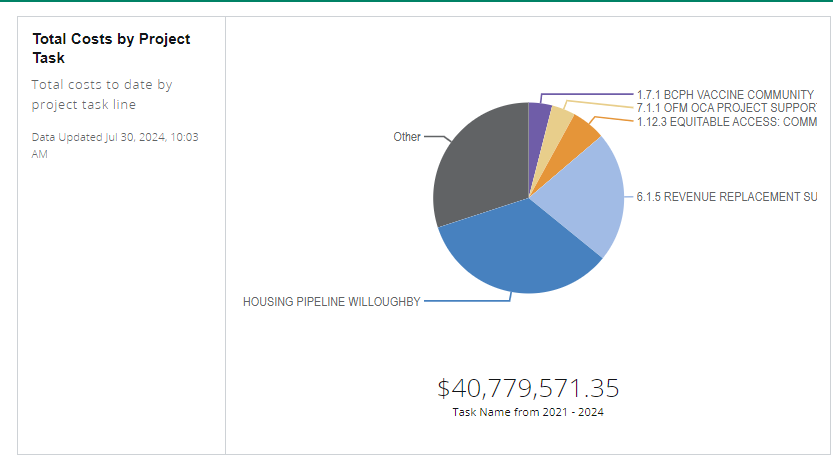
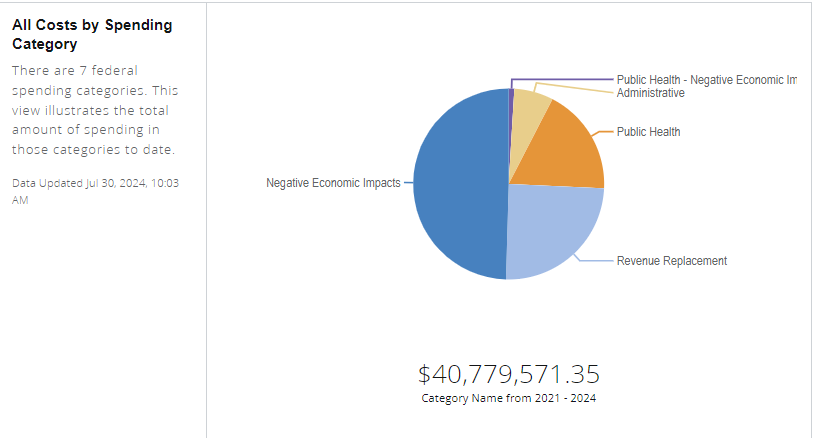
In January 2022, Treasury provided the opportunity for a one-time standard allowance of up to $10 million in the revenue replacement category of eligible uses, whether revenue was lost or not, to be spent on general government services. The Boulder County Commissioners opted into the standard allowance and directed that revenue replacement dollars be expended on projects that address disparate pandemic-related impacts identified by and in the community. Projects selected for this category are referred to as Spirit of ARPA Projects (SOAP) and were recommended in Immediate Needs or the Phase 2 Working Group process, ensuring these projects remain true to the intention of addressing disparate pandemic-related impacts identified by and in the community.
The Boulder County Commissioners further directed that revenue replacement dollars be expended on projects that align with needs identified by the community and the ARPA Working Groups, but that would not be possible to implement due to program complexity, administrative burden, or eligibility and other constraints of the ARPA funds. Projects allocated under the $10 million revenue replacement category include Digital Divide and Family Resource Center projects totaling $2,057,396. Additionally, $7.94 million of annual budgeted funding from the county general fund for Boulder County Public Health (BCPH) was funded instead from ARPA revenue replacement dollars, freeing up that same amount in the county general fund for SOAP projects. The $7.94 million freed up through ARPA revenue replacement is funding:
- Manufactured Housing Park Acquisition and Upgrades
- Regional Housing Partnership
- Habitat for Humanity of the St. Vrain Valley
- Small Business Back Taxes
The dashboard Spirit of ARPA Projects (SOAP) from Revenue Replacement Funds provides a breakdown of each funding category, and as transparency is a priority at Boulder County, this website will be updated with spending updates, key performance indicator data, and additional program information.
NOTE – The SOAP Expenditures chart shows the expenditure amounts for each SOAP project. To learn more about SOAP investments, visit the Spirit of ARPA Projects (SOAP) from Revenue Replacement Funds Dashboard or the SOAP Expenditures chart.
Stay Informed
ARPA News
Longmont Public Media Highlights the Progress of the Affordable Housing Project, Willoughby Corner
Boulder County Commissioner Marta Loachamin and Tanya Jimenez, Housing Developer with the Boulder County Housing Authority, were invited to the Longmont Public Media studios for an interview to share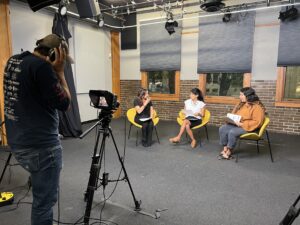 updates on ARPA investments in affordable housing options for Boulder County communities.
updates on ARPA investments in affordable housing options for Boulder County communities.
The interview highlighted the progress of Willoughby Corner construction, supported by ARPA funds. Willoughby Corner is a planned neighborhood of permanently affordable homes. The Boulder County Housing Authority (BCHA) is developing the project, which will include 400 homes in a variety of building types, such as duplexes, townhomes, and apartments.
Watch the interview on ARPA investments in affordable housing options and the Spanish interview on affordable housing options.
- Boulder County Releases the 2023 Annual ARPA Recovery Plan Performance Report
- Boulder County Releases 2022 Performance Report for Federal Recovery Funds
- Boulder County Board of County Commissioners Approves $36.5M in Second Round of Funds for COVID-19 Recovery/June 2022
- ARPA Working Groups virtual presentation of ideas on Tuesday, May 3/April 2022
- ARPA working groups appointed to advise effective and equitable investment of federal pandemic relief funds/February 2022
- Next Steps for ARPA Federal Funds and the Second Phase of Community Engagement and Planning Process Announced/December 2021
- Boulder County Commissioners Provide Progress Report and Announce Opportunities for Public Input on Federal COVID-19 Relief Funding/September 2021
- Boulder County hears proposals for $63M in federal relief money|yahoo.com|Daily Camera|May 4, 2022)
- American Rescue Plan Act working groups will present recommendations to invest the ARPA Funds on Tuesday, May 3|The Longmont Leader|April 29, 2022
- ARPA working groups appointed to advise effective and equitable investment of federal pandemic relief funds|The Longmont Leader|February 27, 2022
- Boulder County creates three groups to recommend ARPA spending|dailycamera.com|February 25, 2022
- Boulder County forms three groups to recommend ARPA spending|Colorado News|February 25, 2022
- Where Does Boulder Need The Most Federal Support?|KGNU News|February 14, 2022
- County Commissioners – American Rescue Plan funding Town Hall |goldhilltown.com| September 6, 2021
- Boulder County commissioners to hold Thursday town hall, seek ideas for spending federal COVID-19 recovery funds|dailycamera.com|September 5, 2021
- How Would You Spend $63 Million?|Out Boulder County|October 12,2021
- How Should American Rescue Plan Funds Be Spent in Boulder County? | News City of Louisville| October 04, 2021
- Updates and highlights on the $63.3 million American Rescue Plan Act (ARPA) (April 2023). Send your comments to ARPAinput@bouldercounty.gov
- ARPA Working Groups presentations and meetings. Send your comments to ARPAinput@bouldercounty.gov
- Boulder County Board of Commissioners Town Hall on public input of ARPA funds investment.
- Boulder County Commissioners’ Public Meeting on American Rescue Plan Act Community Engagement: Results from the ARPA Steering Committee’s six weeks of outreach to better understand the impact of the COVID-19 pandemic on community members.
- Boulder County ARPA News, May 2025
- Boulder County ARPA News, March 2025
- Boulder County ARPA News, January 2025
- Boulder County ARPA News, September 2024
- Boulder County ARPA News, July 2024
- Boulder County ARPA News, May 2024
- Boulder County ARPA News, March 2024
- Boulder County ARPA News, January 2024
- Boulder County ARPA News, November 2023
- Boulder County ARPA News, September 2023
- Boulder County ARPA News, July 2023
- Boulder County ARPA News, May 2023
- Boulder County ARPA News, March 2023
- Boulder County ARPA News, February 2023
- Boulder County ARPA News, January 2023
- Boulder County ARPA News, December 2022
- Boulder County ARPA News, November 2022

